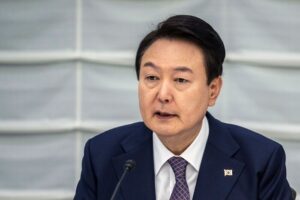
South Korean President Yoon Seok-yol has arrived in Ukraine on an unannounced visit, South Korea’s Ryonhap news agency reported.
“Yoon and first lady Kim Kyung-hee arrived in Ukraine from Poland,” the agency quoted the president’s senior press secretary Kim Eun-hye as saying Saturday.
Yoon reportedly visited the site of mass killings in Bucha near Kiev and then visited Irpin.
According to the news agency, the South Korean president “plans to lay a wreath at a war memorial before holding a meeting with Ukrainian President Volodymyr Zelensky.”
The visit comes at the end of a two-stage trip of the South Korean president, during which he visited Lithuania at the North Atlantic Treaty Organization summit and then Poland on an official visit.
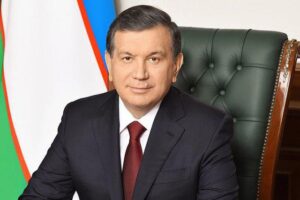
Uzbekistan’s incumbent president Shavkat Mirziyoyev won last Sunday’s early presidential election with 87.5% of the votes, the head of the Central Election Commission Zayniddin Nizamkhojaev said.
“According to preliminary data, 13 million 625,055 people or 87.5% of voters who took part in the voting cast their votes for Mirziyoyev,” the CEC head said at a briefing on Monday.
Under Article 35 of the law “On the Election of President of the Republic of Uzbekistan,” this entitles him to be considered the elected head of state.
More than 19.5 million voters registered for the presidential election in Uzbekistan. Some 15,671,405 voters took part in the elections. Between June 28 and July 5, more than 800,000 voters, including about 188,000 abroad, cast their ballots early.
Four candidates ran for president of Uzbekistan, including current head of state Shavkat Mirziyoyev, nominated by the Movement of Entrepreneurs and Business People – Liberal Democratic Party of Uzbekistan (UzLiDep). His candidacy was also supported by the Democratic Party Milliy Tiklanish (National Revival).
The People’s Democratic Party nominated its leader Ulugbek Inoyatov, the Ecological Party its chairman Abdushukur Khamzaev, and the Social Democratic Party Adolat (“Justice”) its first deputy chairman Robakhon Makhmudova.
As a result, according to preliminary data from the CEC, 649 thousand 116 voters (4.2%) voted for the candidate of the PDPU, 693 thousand 634 (4.43%) for the representative of “Adolat” and the candidate of the Ecological Party got 585 thousand 714 votes (3.74%).
According to the CEC, the final results of the elections, held on July 9, will be announced within ten days.
In the past presidential election, 80.12% of the vote for Mirziyoyev, the UzLiDep nominee, October 24, 2021, was cast.
The current presidential election was the first since the introduction of constitutional amendments to extend the president’s term of office from five to seven years. According to the constitutional law, the incumbent head of state, Mirziyoyev, who is in his second term, can run for office again.
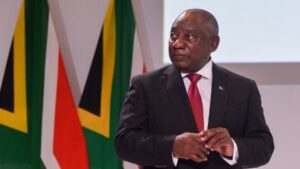
South African President Cyril Ramaphosa will visit Kiev on Friday as part of his participation in the African peacekeeping mission, where he will meet with Ukrainian President Vladimir Zelensky to discuss a “peace plan” to end the war, the South African presidential press office reported.
Ramaphosa reportedly visited (Warsaw) Poland on Thursday, June 15, where he met with President Andrzej Duda.
The South African president is now on his way to Kiev for talks with President Zelensky. The mission includes leaders from South Africa, Zambia, Comoros, Congo-Brazzaville, Egypt, Senegal and Uganda as representatives of a continent that has experienced the adverse economic effects of war.
Earlier, the South African president held talks with Russian President Vladimir Putin, President Zelensky, Chinese President Xi Jinping and UN Secretary-General António Guterres.
Ramaphosa wants to make efforts to promote a “peaceful” process to resolve the Russian war against Ukraine. On Saturday, he and his delegation will arrive in Moscow for talks with Putin.
EGYPT, KIEV, PRESIDENT, SOUTH AFRICA, ZAMBIA, Сенегал, Уганда

Foreign Minister Edgar Rinkevich nominated by New Unity has been elected president of Latvia in the third round of voting in the Saeima.
Fifty-two deputies voted for Rinkevich, the minimum required being 51 votes.
Uldis Pilens, the United List candidate, received 25 votes in the third round.
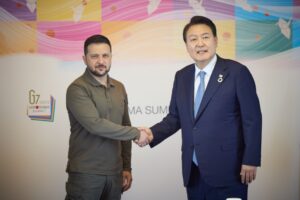
Ukrainian President Volodymyr Zelensky, during a meeting held as part of a working visit to Japan to attend the G7 summit, discussed the recent visit of a Ukrainian delegation with President Yoon Seok Yeol of the Republic of Korea.
“Told about the situation on the front and the progress of our state’s repulsion of full-scale aggression. Discussed the recent visit of the Ukrainian delegation to the Republic of Korea. Acknowledged the attention to the projects presented by the first lady of Ukraine,” Zelensky wrote in his telegram channel on Sunday.
He also thanked for the humanitarian and non-lethal assistance to Ukraine provided by South Korea, in particular for the provision of demining machines and protective equipment.
According to the press service of the President of Ukraine, the parties confirmed the agreements reached during the Ukrainian delegation’s stay in South Korea and agreed to exchange visits of the delegations.
Zelenskyy also noted the high level of organization of the visit and thanked for the attention to the projects presented by the first lady of Ukraine.
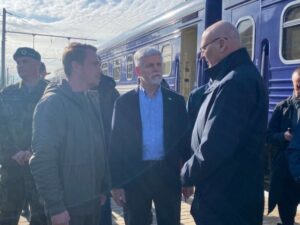
Czech President Petr Pavel together with Slovak President Zuzana Chaputova arrived in Ukraine on a visit.
“With Zuzana Chaputova, we both understand the value of freedom and justice. It is hard to see with our own eyes that Ukrainians are paying the highest price for it. With the blood and lives of its citizens. In fighting the aggressor, he defends what we have in common. That’s why we will support them,” Pavel wrote on Twitter, showing a picture with the president of Slovakia in front of the destroyed building.
For its part, the Czech media outlet Denikn reported that the Slovak president and her Czech counterpart Petr Pavel arrived in Kiev early this morning.
This is the first visit of the Czech head of state to Ukraine since 2013.
Pavel and Chaputova will meet with Ukrainian President Volodymyr Zelensky and Prime Minister Denys Shmygal, and will also visit cities liberated from Russian occupation near the capital.
A meeting with Crimean Tatar representatives Mustafa Dzhemiliev and Refat Chubarov is also scheduled.
Chaputova also later tweeted about the joint visit to Ukraine.
“Our first joint visit abroad with Peter Paul to Ukraine with a message of friendship, solidarity and support. Slovakia, the Czech Republic and Ukraine share parts of a common history – and we also share our common future,” she stressed.
The Czech TV channel ČT24 reported that the Czech and Slovak presidents visited Irpen, then went to Borodyanka. In addition, the Czech president then headed to Bucha.